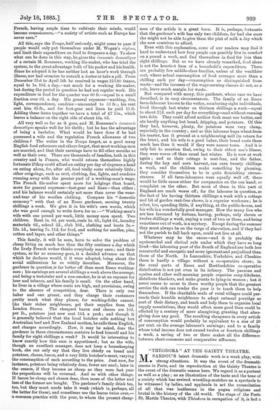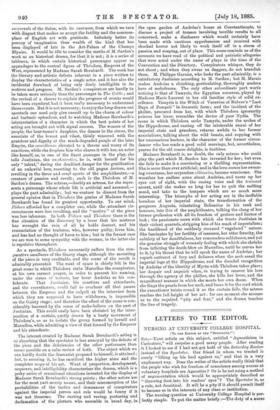" THEODORA" AT THE GAIETY THEATRE.
MSARDOIPS latest dramatic work is a weak play, with . strong situations. It was the event of the dramatic season in Paris, and its reproduction at the Gaiety Theatre is the event of the dramatic season here. We regard it as a portent as well as a play ; as an illustration of the taste and the tone of a society which has revived wrestling-matches as a spectacle to be witnessed by ladies, and applauds in art the resuscitation of all that was loathsome in the pagan religions and brutal in the history of the old world. The stage of the Porte St. Martin Theatre, with Theodora in occupation of it, is but a
succursale of the Salon, with its canvases, from which we turn with disgust that makes us accept the futility and the common- place of English art with gratitude. Infinitely better its penury of imagination than wealth of the kind that has been displayed of late in the Art-Palace of the Champs Elysees. It would be idle to consider the merits of M. Sardou's work as an historical drama, for that it is not ; it is a series of tableaux, in which certain historical personages appear as appendages to the central figure of Theodora, Empress of the West, represented by Madame Sarah Bernhardt. The work has tie literary and artistic defects inherent in a piece written to display the characteristics of a single actor, and it has also the incidental drawback of being only dimly intelligible in its motives and progress. M. Sardon's conspirators are hardly to be taken more seriously than the personages in The Critic ; and the revival of a chorus to explain the progress of events would have been expedient had it been really necessary to understand those events. But it is not necessary; to enjoy the long-drawn-out spectacle one need only give oneself up to the charm of colour and barbaric splendour, and to watching Madame Bernhardt's interpretation of a character in which the best points of her acting are brought out with signal success. The woman of the people, the bear-tamer's daughter, the dancer in the circus, the associate of the lowest and vilest, thinly veneered with the grandeur and dignity of the much-degraded purple of the later Empire, the comedienne elevated to a throne and weary of its exactions, while she despises him who shares it with her, an actor like herself, as, in one of the finest passages in the play, she tells Justinian, the ex-charretier, he is, with herself for his only "talent," daring the deadliest danger for the gratification of an unlawful love, resorting to the old pagan devices, and revelling in the fierce and cruel sports of the amphitheatre,—a creature of passion and revolt ; such is the Theodora of M. Sardon's drama. The actress,—doubly an actress, for she repre- sents a personage whose whole life is artificial and assumed,— plays the part admirably ; but we venture to dissent from the general opinion that in Theodora the genius of Madame Sarah Bernhardt has found its greatest opportunity. To our mind, Fedora afforded her a completer one, while the attendant cir- cumstances were less revolting, and the " motive " of the piece was less inhuman. In both Fedora and Theodora there is the fine situation of the discovery by a lover that his mistress has wrought the ruin of all he holds dearest, and his renunciation of the traitress, who, however guilty, loves him, and has had no thought of harm to him ; but in the former case we are won to some sympathy with the woman, in the latter she is repulsive throughout.
As a spectacle, Theodora necessarily suffers from the com- parative smallness of the Gaiety stage, although the mounting of the piece is very creditable, and the scene of the revolt is admirably presented. The want of space is chiefly felt in the great scene in which Theodora stabs Marcellus the conspirator, at his own earnest prayer, in order to prevent his naming, under the stress of torture, her lover Andreas as his con- federate. That Justinian, his courtiers and attendants, and the executioners, could fail to overhear all that passes between the Empress and the culprit at the interview from which they are supposed to have withdrawn, is impossible on the Gaiety stage; and therefore the effect of the scene is con- siderably lessened by the sense of make-believe on the part of Justinian. This could easily have been obviated by the inter- position of a curtain, partly drawn by a hasty movement of Theodora's, so as to isolate the group formed by herself and Marcellus, while admitting a view of that formed by the Emperor and his attendants.
The interest created by Madame Sarah Bernhardt's acting is so absorbing that the spectator is less annoyed by the defects of the piece and the deficiencies of the other performers than seems possible on a calm review of both. The object which we can hardly doubt the dramatist proposed to himself, is attained ; but, to securing it, he has sacrificed the higher aims and the completer scope of his art. Want of proportion, development, sequence, and intelligibility characterises the drama, which is a jerky series of sensational situations invented for the display of Madame Sarah Bernhardt's strong points ; the other actors are for the most part merely names, and their misconception of the probabilities of the tactics and demeanour of conspirators against the imperial person and rule would be funny if it was not tiresome. The ranting and raving, posturing and declamation of the plotters who assemble in broad day, in the open garden of Andreas's house at Constantinople, to discuss a project of treason involving terrible results to all concerned, make a disclosure which would certainly have been made with cautious apprehension and received with shocked horror not likely to work itself off in a storm of passion and weeping, out of place. This scene reminds us of the accounts we have read of the political and patriotic allegories that were acted under the name of plays in the time of the Convention and the Directory. Conspirators whisper, they do not shout ; and when they swear on daggers, do not brandish them. M. Philippe Gamier, who looks the part admirably, is a satisfactory Justinian according to M. Sardon ; but M. Marais makes Andreas a shrieking, gesticulating, thoroughly modern hero of melodrama. The only other subordinate part worth noticing is that of Tam vris, the Egyptian sorceress, played by Madame Marie Laurent in her old familiar style of solid ex- cellence. Tamyris is the Witch of Vesavins of Bulwer's "Last Days of Pompeii" in dramatic form ; and the incident of the philtre, procured from her, with which Theodora ignorantly poisons her lover, resembles the device of poor Nydia. The scene in which Theodora. seeks Tamyris, under the arches of the Hippodrome, and casting off the intolerable ennui of her imperial state and grandeur, returns awhile to her former associations, talking about the wild beasts, and supping with her unconscious hostess, in the character of the former circus- dancer who has made a good solid marriage, but, nevertheless, yearns for the old coarse delights, is faultless.
Madame Bernhardt is, no doubt, the only actress who could play the part which M. Sardou has invented for her; but even she fails to make it a convincing or a thrilling representation. She is more than ever artificial; and in the love-scenes her swoon- ing sweetness, her serpentine ccilineries, become wearisome. She wreathes her endless arms about Andreas, and turns up her eyes out of sight, with the cooing voice and the trainant accent, until she makes us long for her to quit the melting mood, and take to the tempers which are so much more interesting. The triumphs of her acting are in the ineffable boredom of her imperial state, the transformation of the gorgeous Augusta, reinstating Belisarius in his rank and honours, into Zoe of the amphitheatre, talking the slang of her former profession with all its freedom of gesture and license of look ; the passionate scorn with which she treats Justinian in their violent quarrels, stripping him of his mask of imperialism; the hardihood of the suddenly resumed " vagabond " nature. She fascinates by her fertility of resource, her utter ferocity, the subtlety of her deceitfulness, her remorseless selfishness, and yet the genuine struggle of womanly feeling with which she shrinks from inflicting the death-blow on Marcellus, until he nerves her to it, by his threat that he will speak the name of Andreas; her superb outburst of fury and defiance when the mob assail the imperial loge at the Hippodrome, and the dreaded recognition by Andreas of the identity of Myrta with Theodora takes place; her despair and anguish when, in trying to recover his love through the agency of the philtre, she kills her lover, and the magnificent manner in which she meets her own doom. When she flings the pearls from her neck, and bares it for the cord which the executioner twists round it as the curtain falls, the actress reaches the full height of her art : for one moment she arouses us to the required "pity and fear," and the drama touches the line of tragedy.



































 Previous page
Previous page